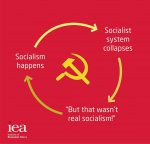The Venezuelan regime controls the supply and prices of most goods like food, medicine, oil, and even toilet paper. The country is in the mess it is now because of government meddling in every facet of the economy and a blatant disregard for the people and their rights.
Do conservative people here think that socialism is viewed by liberals as some perfect system?
How on Earth does that make any sense to a rational human being?
It is absolutely possible to have crooked despots running a socialist economy, every bit as much as crooked despots can take control of a capitalist economy.
Socialism, fascism and capitalism can all be affected by gross incompetence, poor moral values and rotten ethics.
And in the case of Venezuela, not only do we see all three factors, we also see the general appearance of a totalitarian approach more than anything else to boot. Venezuela's economy was lopsided and poorly planned long before socialism, almost completely dependent upon oil and heavily leveraged.
Russia's system went from a collapsed communist system to heaving attempts, in fits and starts, at a rudimentary form of capitalism, which also quickly collapsed, at which point we saw a lurch into totalitarianism, and they are moving toward fascism now.
America has always had a capitalist economy, it is something that people value, and yet in the postwar era we learned that regulated capitalism was able to serve as a tool to serve the middle class. That didn't exclude the wealthy elites, it just made the playing field more fair for working families.
Now that the controls have been lifted, we've seen a forty year plunge in earning potential, a loss of upward mobility, income inequality and a loss of stability and security.
It's not that capitalism has failed, it's that the people who own the levers of capitalism have failed. They have failed to protect working families.
The disease which affects all these economic disciplines is the obsession with purity. The more purist you get, the more fundamentalist you get and the more fundamentalist you get, the more irrational you get.
Few Americans want to see us transition to a socialist economy. We don't have experience with it, so we would not be any good at running it.
What they WOULD like to see is ways to FIX our capitalist system.
Adding a minor socialist tweak to capitalism doesn't turn it into socialism, it just adds to the gene pool and creates a stronger hybrid.
Since we are historically capitalist, we should not go far with socialist tweaks at all, let capitalism be what it is.
We can't fix everything, and we're never going to have a perfect system, no matter what we try.
But that doesn't mean we can't make what we have work better for a larger number of people.
I am a liberal, and I am not itching to ditch our capitalist system for an experiment with socialism.
But I know that we used to be smart enough to know how to do the economic "chemistry" work needed to keep our capitalist system fair, and strong, for all of us.
History is there, if we want to study what worked.

